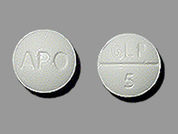Glipizide
Glipizide
What is Glipizide used for?
Glipizide is used with a proper diet and exercise program to control high blood sugar in people with type 2 diabetes. It may also be used with other diabetes medications. Controlling high blood sugar helps prevent kidney damage, blindness, nerve problems, loss of limbs, and sexual function problems. Proper control of diabetes may also lessen your risk of a heart attack or stroke. Glipizide belongs to the class of drugs known as sulfonylureas. It lowers blood sugar by causing the release of your body's natural insulin.
CHEMICAL NAME
DRUG TYPE
DiabetesGlipizide Prices
Searching for the lowest prices
What does Glipizide look like?
View all Glipizide Image Information (9)Glipizide Frequently Asked Questions
Take this medication by mouth 30 minutes before breakfast or the first meal of the day as directed by your doctor, usually once daily. Some patients, especially those taking higher doses, may be directed to take this drug twice a day. The dosage is based on your medical condition and response to treatment.
To reduce your risk of side effects, your doctor may direct you to start this medication at a low dose and gradually increase your dose. Follow your doctor's instructions carefully.
Colesevelam can decrease the absorption of glipizide. If you are taking colesevelam, take glipizide at least 4 hours before taking colesevelam.
Use this medication regularly to get the most benefit from it. To help you remember, take it at the same time(s) each day.
Tell your doctor if your condition does not get better or if it gets worse (your blood sugar is too high or too low).
IMPORTANT: HOW TO USE THIS INFORMATION: This is a summary and does NOT have all possible information about this product. This information does not assure that this product is safe, effective, or appropriate for you. This information is not individual medical advice and does not substitute for the advice of your health care professional. Always ask your health care professional for complete information about this product and your specific health needs.



